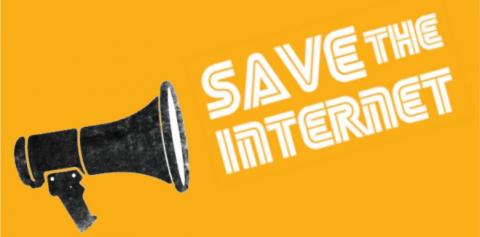
The end of net neutrality as we know it?
On Thursday, 5/15 the U.S. Federal Communications Commission (FCC) meets to propose new rules "to protect and promote the open Internet." It has no choice because a U.S. appellate court threw out parts of its current rules in a January decision favoring the telephone company Verizon. The decision did not eliminate FCC authority to regulate the Internet, but it did make it more complicated.
On Thursday , 5/15 the U.S. Federal Communications Commission (FCC) meets to propose new rules “to protect and promote the open Internet.” It has no choice because a U.S. appellate court threw out parts of its current rules in a January decision favoring the telephone company Verizon. The decision did not eliminate FCC authority to regulate the Internet, but it did make it more complicated.
, 5/15 the U.S. Federal Communications Commission (FCC) meets to propose new rules “to protect and promote the open Internet.” It has no choice because a U.S. appellate court threw out parts of its current rules in a January decision favoring the telephone company Verizon. The decision did not eliminate FCC authority to regulate the Internet, but it did make it more complicated.
So while the FCC has no choice but to act at some point, where the FCC does have a choice is deciding what to do. The problem is that some of FCC Chairman Tom Wheeler’s preliminary comments suggest he’s for killing the core feature of the open Internet, Net Neutrality, in order to save it. While he has retreated somewhat, he has generally indicated he is in favor of allowing Internet providers (big phone and cable companies) to charge extra for “paid prioritization.” You may recall this issue as it was originally described years ago: “paying for fast toll lanes on the Information Superhighway.” It would allow big, rich companies — think Google, Amazon and Netflix — to dominate the web and make it harder for the next innovative, new, small competitors in tomorrow’s dorm rooms and garages to ever catch on. And it would give commercial content a huge advantage over important non-commercial content, like you see at U.S. PIRG, The Consumerist, Free Press or any of thousands of other non-profit or government sites you use.
By allowing companies to pay more to gain faster access means others will have slower content, coming and going. As Professor Tim Wu, who originally developed the concept of and coined the term “network neutrality” told Jeff Sommer for a story in the NY Times this weekend, “Defending the Open Internet:”
“Sometimes what everybody thinks about the law is more important than what the law itself says. I think that’s what’s happened with net neutrality. It’s become a kind of norm of behavior, what you can and can’t appropriately do with the Internet. It’s got to be open. Except for legitimate purposes like protecting the network itself, there shouldn’t be discrimination against one form of content or another or one provider or another. And people generally accept that. Until now, the idea in a way has been more important than what the regulations have actually said.”
Indeed, that’s why some of the big companies that would clearly benefit from the Wheeler proposal have pulled away from it, in a letter to Wheeler and the FCC. That letter, and Wheeler’s response, are discussed by David Carr of the New York Times here. Of course, as the article notes, Netflix, despite signing the pro-net neutrality letter, has already started paying extra for faster lanes, since the January court decision.
This blog post from our ally Free Press links to some key letters and documents and also explains how you can join in opposition to the FCC proposal, including by joining a rally outside the FCC Thursday. Free Press even has a special site with downloadable materials you can add to your site (such as the megaphone graphic in this post). Ally Public Knowledge notes on its own blog that at least two of the five FCC commissioners, Jessica Rosenworcel and Mignon Clyburn, want tougher rules than Wheeler originally proposed. As the PK blog and numerous sources note, Wheeler now has clarified that he remains “open” to re-classifying the Internet as a “telecommunications service.” It’s a critical legal distinction. The Internet is currently an “information service,” which is a category subject to less FCC regulatory authority and leaves the future of an open Internet at risk. Of course, any re-classification will be opposed by Verizon, AT&T and Comcast, to name a few companies, but not really at random.
Apparently the FCC’s getting a lot of calls. The papers are reporting that its answering machines urge you to hang up and send an email. Commissioner Rosenworcel has asked for the Thursday vote to be delayed, but new drafts could be shopped to other commissioners by Wheeler as early as today.
Here’s a link to a pdf of Tim Wu’s original 11 page paper from June 2002, “A Proposal For Network Neutrality.”
Topics
Authors
Ed Mierzwinski
Senior Director, Federal Consumer Program, PIRG
Ed oversees U.S. PIRG’s federal consumer program, helping to lead national efforts to improve consumer credit reporting laws, identity theft protections, product safety regulations and more. Ed is co-founder and continuing leader of the coalition, Americans For Financial Reform, which fought for the Dodd-Frank Wall Street Reform and Consumer Protection Act of 2010, including as its centerpiece the Consumer Financial Protection Bureau. He was awarded the Consumer Federation of America's Esther Peterson Consumer Service Award in 2006, Privacy International's Brandeis Award in 2003, and numerous annual "Top Lobbyist" awards from The Hill and other outlets. Ed lives in Virginia, and on weekends he enjoys biking with friends on the many local bicycle trails.
Find Out More

Apple AirPods are designed to die: Here’s what you should know

New report reveals widespread presence of plastic chemicals in our food

Consumers call on Meta to protect kids’ safety in Quest virtual reality
